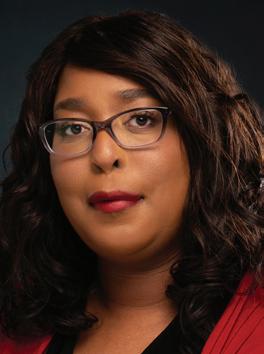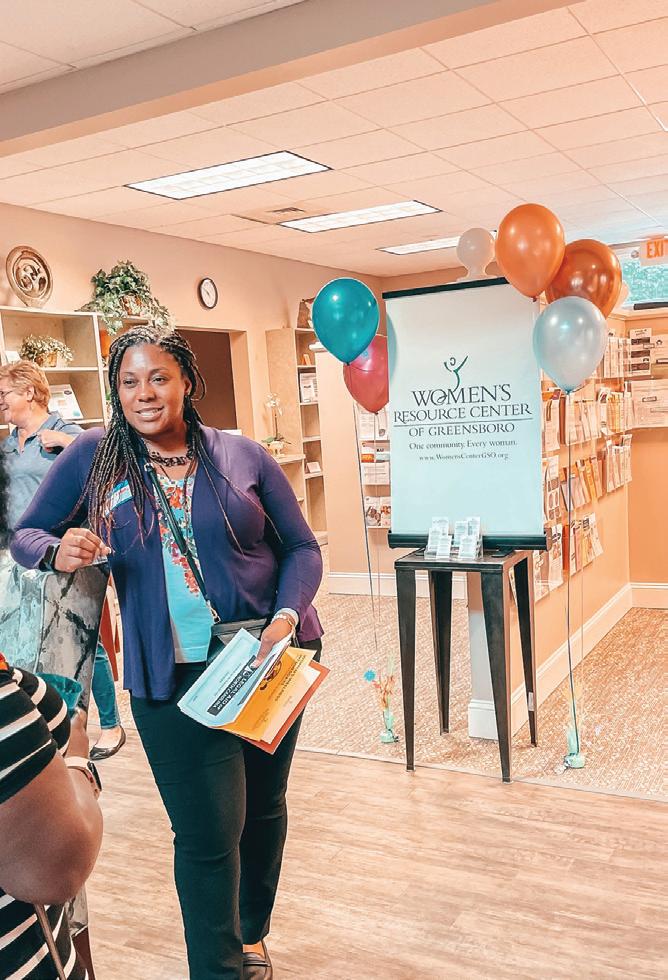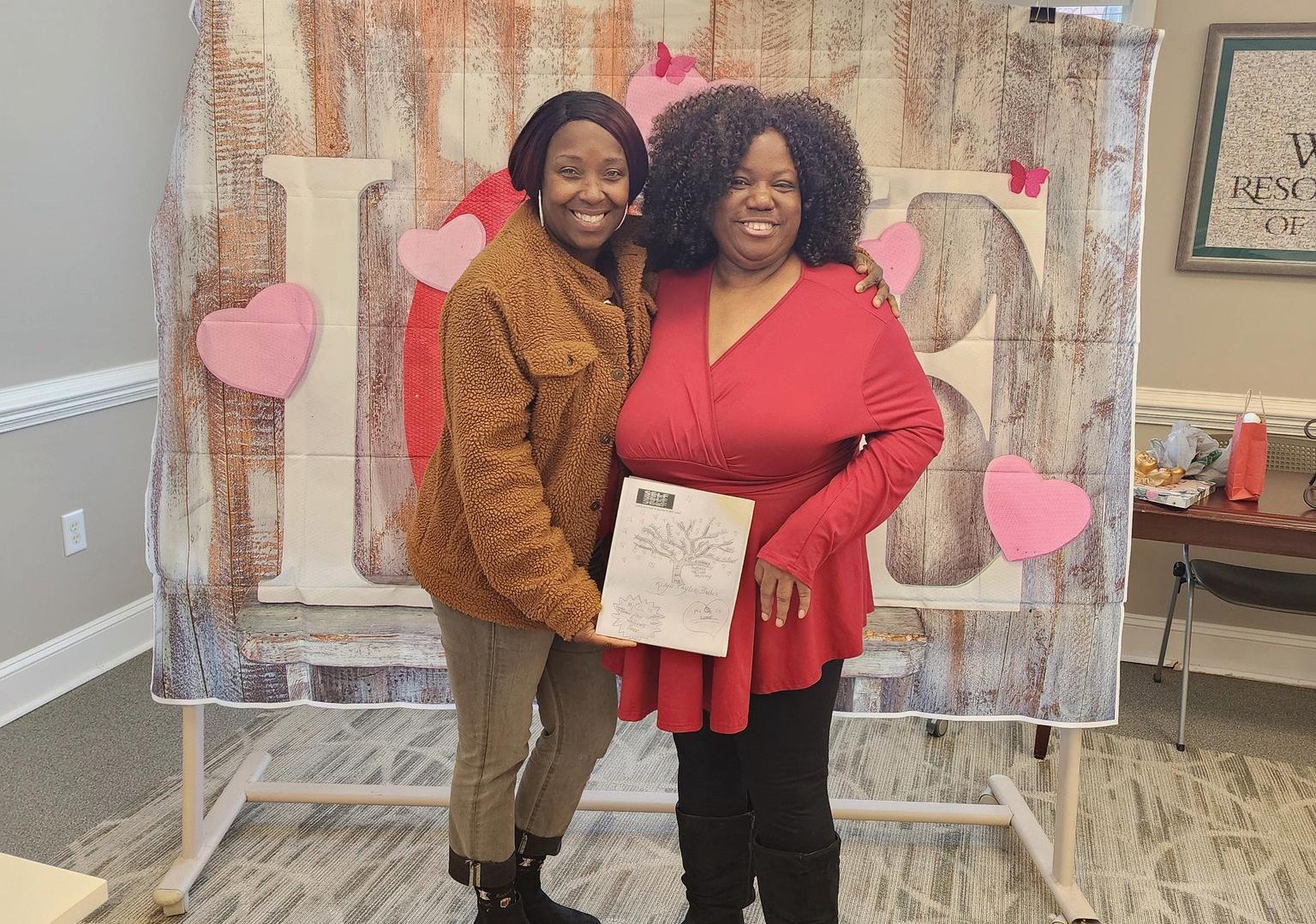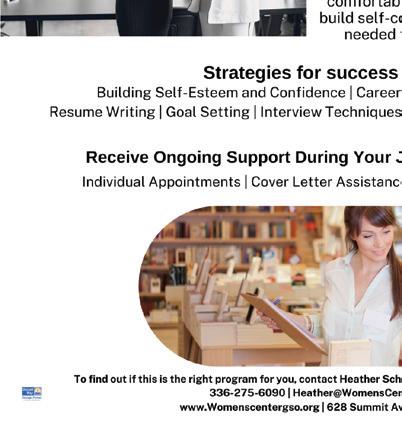
6 minute read
Closing the Circle: The Women’s Resource Center points women in the right direction

It’s all about helping women and meeting their needs at the Women’s Resource Center of Greensboro.
Advertisement
Located at 628 Summit Ave., the Women’s Resource Center of Greensboro is designed to help women
“navigate life’s hurdles, to access community services, to develop new skill sets, to move lives forward,” according to the organization’s website.
Its mission states that it wants “to promote the self-reliance of women by assessing needs, providing services, and acting as a gateway to community resources. In seeking solutions for unmet needs, the WRC provides strategic leadership through collaboration and partnerships within the community.”
All of the political pleasantry and fancy language aside, Hope Strickland calls the center a hidden gem that women have come to rely on more and more.
“I think every woman that I know, knows a woman or knows that she herself can use something that we do here. You might be in poverty, you might be trying to leave a dangerous situation, and a lot of times you don’t know where to go,” said Strickland, director of Community Education and Engagement at WRC. “Our whole purpose is to help women achieve self-reliance and to be able to make their lives better for themselves. A lot of times if a woman comes here, we don’t do all of the services here but we know who does so we can make what’s probably a really frustrating situation for a woman in Greensboro, a little bit easier. Lighten her load just a little bit. Arm her with the information she needs to get out and be able to do what she needs to do. I think that we’re a gem in Greensboro. We’ve got all these wonderful nonprofit partners. We know what they do, what kind of clients they see, and what the client can expect when they get there. We are just trying to make a woman’s situation as easy as possible for her to manage for her to be able to run with it and do her thing.”
Birthed in the mid-1990s by four local women — Marian O’Connor Franklin, Vivian Lutian, Ashley Brooks, and Susan Sassmann — came up with the idea to create a safe space for women to come that will help navigate them through the hoops of gaining assistance, support, and resources.
The WRC opened on August 26, 1995, in downtown Greensboro’s Ireland House. The center offered programs in peer advocacy, a job-training program, a free attorney hotline, a computer data bank, a library for women’s issues, and a barter board where women could exchange information about goods or services, according to its website.
Since serving roughly 800 women in the first year of business, they currently serve roughly 4,000 women, and anybody identifying as a woman aged 18 and up, a year.
“We see women who are experiencing homelessness, we see women with two PhDs, and everything in between. We’re here to help in any way that we can,” Strickland said.
Though the organization is celebrating its 28th year, the basics when it comes to programming remain true.
The free attorney hotline assists community women in making informed decisions based on knowledge of their legal rights and responsibilities. Statelicensed attorneys volunteer their time to answer questions in more than 20 areas of law including Civil, Criminal, Bankruptcy, Real Estate, Domestic/ Family, Consumer Rights, and Wills/Probate. There are also attorney-led workshops that discuss topics like divorce/ separation/child custody, landlord/tenant issues, debt/credit repair, and more.
“We have about 15 volunteer attorneys, and we would love to have about 10 more. They have 20 or so specialties and women can call in and get an appointment with an attorney for free, so that they can make sure that their legal rights and responsibilities are clear to them and that they have a good grasp of what their situation is,” Strickland said.
The Women to Work Program is a program designed to prepare women for the workforce via group settings and individual sessions. The program covers career assessments, marketable skills, resume development, interviewing techniques, goal setting, and networking.
“This is a job readiness program for women who are interested in upgrading their careers or starting a new career. They learn things like resume writing and interview skills and how to build your brand on Linkedin, dressing for success, and all that kinds of stuff,” Strickland said.
One success story that Strickland touts is of a young woman who went from sleeping in her car with her children to working full-time.
“There was a woman who had a situation where she was experiencing homelessness. She had three kids and they were sleeping in their car outside of the Interactive Resource Center. She got into the program and now she’s got a full-time job,” she said. “No, she’s not a millionaire but she’s able to put food on the table and take care of her children.”
The Community Education Workshops focus on topics that range from financial to emotional and physical help. Led by community experts and professionals, these workshops are designed to give women information to help them grow in life. Topics include budgeting, credit repair, home buying, self-defense, and community resource counseling specialists who help women reach their goals.
Strickland said that the organization goes beyond helping women who just live in Greensboro and that they are for the betterment of all women.

“Our resources counselors are experts in what’s in Greensboro and Guilford County, mostly Greensboro. However, anybody in North Carolina can use our career services. They can get an appointment with Heather Schneck, she’s our Women to Work Director, and she can email back and forth, help with resumes and talk with people about what their goals are. Our attorneys will talk to anybody across North Carolina.
As far as the resources go, we’re pretty much just in Greensboro. We won’t turn anybody away. We’ve had people from as far away as Wilmington calling us and needing an attorney appointment and we’re happy to help.”

Strickland said that the agency has focused on what it calls “continuous quality improvement.”



“We’re trying to make sure that how we operate is the most useful for the women that we serve. For instance, we’re trying to make sure that everybody is getting back in touch with people in a timely manner. We’re trying to make sure that when we do our follow-up phone call and follow-up emails, that we’re asking the right questions because we don’t want to be offering services that aren’t useful. So we’re really trying to listen and grow from there.”
She said one way to do this is by communicating with clients about what they would like to see offered at the WRC. “We love to ask our clients what kind of workshops they want to see. For instance, last year one of them wanted to do a self-defense workshop and then I noticed more and more people wanted to do a self-defense workshop, so now we have a monthly self-defense workshop. We just want to make sure it’s not just us imagining what the women want. We’re really careful to make sure to ask and check in.”
They also follow up with clients a few weeks later to see how things are going.
“After any class, any resource counseling appointment, any attorney hotline appointment, we do follow-up calls two to four weeks afterward so they can have a minute to use the information and so we can see what they are doing with it,” she explained. “We really want to make sure that they got what they needed from their visit. Usually, when you have a problem, you have two, three, or four problems, right? If you don’t make enough money that’s one problem. You can’t pay your bills. You might have trouble paying your rent, you don’t have enough money for food, and your mental health may be struggling through all of that stuff. If somebody comes in here, we definitely want to check back in with them and make sure that they got what they needed. We find that following up helps to close the circle so we’re not just leaving someone out there floundering trying to figure it out. We do want to arm them with information so that they can go, take care of business, and become selfreliant, but until they reach that point they’re welcome to come back here and use our resources as many times as they need to.”
The center has seen more women these past few years.
“We hear a lot that people had never heard about us but then a girlfriend told them about us and they come in and say I didn’t even know you were here and we’ve been here. There have been times in my own life I could’ve used this place but I had no idea. It’s kind of a well-kept secret, unfortunately. I do think we’re seeing our numbers increase with rent prices going up, it being hard to find a job, and childcare being super expensive. I think people are talking about us a little bit more. They are getting their girlfriends, moms, sisters, and their daughters in here so that they can get a leg up.”
Strickland hopes that someday the center won’t be needed but admits that she doesn’t expect that day to be soon.
“Our goal is to really become obsolete and we hope that everybody gets out of poverty, everybody gets out of domestic violence situations, everybody has a firm ground to stand on,” she said.
“Until that day, we’re happy to be here doing what we’re doing.”
For more information visit, www. womenscentergso.org . !



CHANEL DAVIS is the current editor of YES! Weekly and graduated from N.C. A&T S.U. in 2011 with a degree in Journalism and Mass Communications. She’s worked at daily and weekly newspapers in the Triad region.











